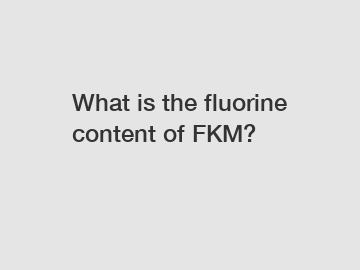What is the fluorine content of FKM?
What is the fluorine content of FKM?
Fluorinated elastomers, also known as fluoroelastomers or FKM, are synthetic rubber-like materials with excellent resistance to chemicals, heat, and oils. These unique elastomers find extensive application in various industries, including automotive, aerospace, pharmaceutical, and chemical. But have you ever wondered about the fluorine content of FKM? In this article, we will delve into this question, exploring the significance of fluorine content, its impact on FKM properties, and considerations for tailored applications.
1. Understanding FKM and its Composition:

FKM is primarily composed of three main elements: carbon (C), hydrogen (H), and fluorine (F). The fluorine content of FKM refers to the percentage of fluorine atoms in the polymer chain. This fluorine content can vary depending on the specific formulation and requirements of the application. Typically, FKM materials contain a fluorine content ranging from 66% to 71%.
2. Fluorine Content and Chemical Resistance:
The high fluorine content in FKM imparts excellent resistance to chemicals, solvents, and fuels. Fluorine atoms possess strong electronegativity, resulting in stronger carbon-fluorine bonds. These strong bonds make FKM resistant to degradation from aggressive chemicals, acids, and bases. The higher the fluorine content, the better the chemical resistance of the FKM material.
3. Impact of Fluorine Content on Temperature Range:
The presence of fluorine atoms in FKM also significantly affects its thermal stability and temperature resistance. The high fluorine content in FKM makes it suitable for applications that involve extreme temperatures, ranging from -20°C to +200°C (-4°F to +392°F). The increased fluorine content introduces enhanced resistance to heat and oxidation, ensuring high-performance elastomers even in demanding environments.
4. Influence of Fluorine Content on Mechanical Properties:
The fluorine content of FKM plays a crucial role in determining its mechanical properties. Higher fluorine content in FKM improves properties like tensile strength, tear resistance, and compression set, making it more durable and reliable. Additionally, it helps maintain the elastomer's flexibility and elasticity over a wide temperature range.
5. Considerations for Tailored Applications:
When selecting an FKM material, it is essential to consider the specific requirements of the intended application. Depending on the application's demands, an appropriate fluorine content can be chosen to optimize specific properties. For instance, an application exposed to harsh chemicals might require an FKM with a higher fluorine content, while an application requiring flexibility at low temperatures may benefit from a lower fluorine content.
6. Balancing Fluorine Content and Cost:
It is worth noting that the fluorine content in FKM materials can impact their cost. Higher fluorine content materials tend to be costlier due to the additional processing steps and raw materials involved. Therefore, it is crucial to strike a balance between the desired properties and cost-effectiveness to choose the most suitable FKM material for a particular application.
In conclusion, the fluorine content of FKM is a vital factor in determining its chemical resistance, temperature range, mechanical properties, and suitability for tailored applications. The high fluorine content lends FKM its exceptional resistance to chemicals and heat, making it an ideal choice for challenging environments. By understanding and leveraging the fluorine content of FKM, engineers and designers can select the most appropriate elastomer to ensure optimum performance and longevity in their respective applications.
For more information, please visit Hammer Top Cow Rubber Mat, Diamond Hammer Top Cow Rubber Mat, High Abrasion Resistance Nr Rubber Sheet.


